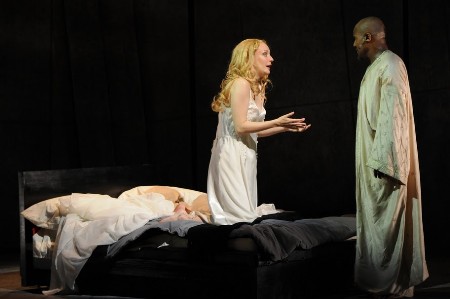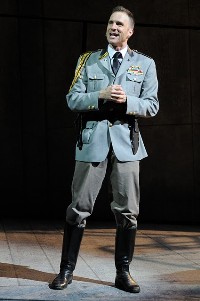Theater Review: A Faint Touch of Evil
Shakespeare’s tragic characters, on the other hand, suffer from the Christian sin of pride: knowing you aren’t God, but trying to become Him—a sin of which any of us is capable. — W. H. Auden on Othello in Lectures on Shakespeare

Marianna Bassham (Desdemona), Seth Gilliam (Othello) in the CSC production of Othello. © Photo by Andrew Brilliant/Brilliantpictures Inc
Othello by William Shakespeare. Directed by Steven Maler. Staged by the Commonwealth Shakespeare Company at the Boston Common, through August 15.
Reviewed by Bill Marx
Iago a tragic figure? W. H. Auden’s vision of Othello invites that kind of arch speculation, fed by the poet’s claim that Shakespeare began the play by focusing on Othello’s lethal case of jealousy but eventually became more “interested in why people like evil, not for their own advantage but for its own sake. The effect of this shift in interest is that Othello becomes a secondary character and Iago dominates the whole play, which finally raises difficult problems for Shakespeare.”
Dilemmas not so much for the Bard as for productions of Othello, which attempt to match the fascinatingly nihilistic drive (the gleeful emptiness?) of Iago with the fated sexual attraction of Desdemona and the Moor. A successful production has to generate plenty of passion, erotic as well as diabolic. Eros wrestling with Thanatos.
Thus the devilish irony of the Commonwealth Shakespeare Company (CSC) production of Othello on the Boston Common. The night I saw the show the weather was balmy and cool, a slice of sheer comfort after the heat wave of a day, the audience’s sweat and cares evaporating away while listening to the poetry of the Bard echo off the walls of the towering buildings on Tremont Street. It was a pleasant experience, and free exposure to Shakespeare is a mitzvah.
But the CSC staging, serviceable but stolid, could have badly used some of the overwhelming heat of the day. In this Othello Iago goes through his malignant motions as if they were business-as-usual—the emotional temperature of the staging remains disappointingly mild throughout, even with Othello first drowning poor Desdemona and then throttling her to death via a sleeper hold. The only extreme was the shrill volume of the sound system (perhaps because some of the actors shout into their mics?) that left your (or at least my) ears ringing. In the case of the decibel level, more restraint would have been valuable.
Even if you don’t agree with Auden that Iago is at the center of Othello, the vacuum-souled figure is hauntingly contemporary: he should be strangely compelling, crazily enigmatic. Auden thinks that Iago would best be played as “plain and inconspicuous, absolutely ordinary, someone who would be chosen as a Secret Service man . . . yet he must dominate the play by his will.” A difficult paradox to pull off. Why would we go to the theater to see Iago as the guy-next-door?
I must admit that I like my Iagos to connive with subtle style, to be connoisseurs of self-satisfaction. Memorable Iagos for me range from Ian McKellan’s ramrod-repressed military marionette and Christopher Plummer’s wily cogitator-in-chief to David Patrick Kelly’s sex fiend, addicted to sniffing Desdemona’s panties. If nothing else, a performer has to pull us into the villain’s plots—inviting our complicity or at least our admiration as he pulls off his schemes with deadly deftness. I have seen impressive stagings of Othello with problematic Moors, but none without a charismatic Iago.
 Alas, James Waterston (pictured at left) provides an Iago who fits Auden’s demand for “plain and inconspicuous” all too well. The actor goes about his character’s nasty business with a loud but dutiful nonchalance, neither monstrous nor momentous. Waterston’s voice, reedy at times, lends some of the lines a comic touch, a kvetchy punch of complaint that undercuts the horror. The audience giggles at lines that should exude some cold fear, a sense of the inhumanly sinister. Director Steven Maler appears to be aware of the lack of the threat in Waterston’s straightforward performance—he brings in some standard uggah-buggah music at times to help make the actor sound diabolical. It doesn’t help much.
Alas, James Waterston (pictured at left) provides an Iago who fits Auden’s demand for “plain and inconspicuous” all too well. The actor goes about his character’s nasty business with a loud but dutiful nonchalance, neither monstrous nor momentous. Waterston’s voice, reedy at times, lends some of the lines a comic touch, a kvetchy punch of complaint that undercuts the horror. The audience giggles at lines that should exude some cold fear, a sense of the inhumanly sinister. Director Steven Maler appears to be aware of the lack of the threat in Waterston’s straightforward performance—he brings in some standard uggah-buggah music at times to help make the actor sound diabolical. It doesn’t help much.
Overall, Maler’s staging comes off as distanced to a fault, smoothly moving the action along but kindling few genuinely dramatic sparks. There is a forward march rhythm to the scenes that emphasize the fuzzy mechanics of the plot. For example, the brilliant episodes in which Iago methodically teases and taunts Othello into a jealous frenzy invite a relaxed caricature of caring intimacy—Iago shamelessly moves into (violates?) Othello’s space, his body flitting around around his prey, his eyes studying every reaction for a cue for what damaging innuendo to say next. Here Iago stands well away from Seth Gilliam’s Othello, an aloof puppet master who figures that pulling the strings of Shakespeare’s language is enough to snare his victim.
As Othello, Gilliam brings welcome vocal variety to his delivery, and he explodes into insane rages with convincing fervor, but there’s simply not enough poetic shock in his fall from command or electricity in his romantic fission with Desdemona, played by Marianna Bassham. Like Cordelia, Desdemona is an innocent soul who believes that goodness serves as its own defense in a wicked world—a cardinal sin in Shakespeare. Bassham comes off as knowing (or at least suspecting), a woman wise to the ways of the world. Adrianne Krstansky’s solid Emilia is not pleading about the “wayward” ways of men to clueless ears.
Dan Roach’s Cassio provides a blunt portrait of blind loyalty, while the supporting performers, Fred Sullivan Jr.and Grayson Powell among them, sometimes become strident, perhaps to play up the racist underpinnings of the society, the motive for Othello’s need to marry Desdemona as a means to “fit in.”
Dutiful rather than inventive (except for the waterlogged dispatch of Desdemona), the CSC production of Othello delivers a faint touch of evil.
Tagged: Boston, Boston Common, Commonwealth-Shakespeare-Company, Othello, Shakespeare
